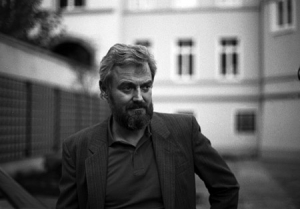Gallery
All Pictures (10)Biography
Peter Nestler was born in Freiburg im Breisgau on June 1, 1937, the son of a Swedish mother and a German father. He attended boarding school until 1953 and then worked for a short time in his father's plastics company. In 1954, he spent four months as a trainee in a Hamburg export company; the same year, he signed on as a seaman on a Swedish tanker. After two years at sea, he took up studies in painting at the Munich Art Academy and learned screen printing in a Stuttgart print shop.
While studying, Nestler appeared as an actor in feature film and television productions from 1958. He played a sailor in Harald Reinl's hit film "Paradies der Matrosen" (1959) and a musician in Géza von Radványi's semi-star drama "Und sowas nennt sich Leben" (1961). He was also part of the ensemble in supporting roles in Helmut Käutner's crime drama "Schwarzer Kies" (1961) and Axel von Ambesser's hit film "Eine hübscher als die andere" (1961).
Peter Nestler made his directorial debut in 1961/62 with the short documentary "Am Siel" ("By the Dike Sluice"), about a village by the sea; together with photographer and HFF graduate Kurt Ulrich, he was also responsible for camera and editing. The two continued working together on the short documentaries "Aufsätze" (1963) and "Ödenwaldstetten" (1964), which were produced for television. For "Aufsätze," children recited texts they had written themselves about their school day; in "Ödenwaldstetten," Nestler traced the social and economic changes in a Swabian village.
Other short documentaries of these years were "Mülheim/Ruhr" (1964), about the changing living situation in the Ruhr area, "Rheinstrom" (1965), about the work of winegrowers and boatmen on the Rhine, and made for TV, "Ein Arbeiterclub in Sheffield" (1965). In addition, Nestler continued to work as an actor, mainly for television, in order to finance his own films.
Because of their coolly distanced, but also poetic style (Nestler often combines newly shot material with historical photos and drawings), Nestler's films were repeatedly criticized at the time of their creation as being too artificial or as distortions of the milieu. A caesura occurred after his half-hour documentary "Von Griechenland" (1965), about the political upheavals in Greece in the mid-1960s. After its premiere at the Oberhausen Short Film Festival, the film was called a "communist machination" in the industry journal Filmecho/Filmwoche. As a result of the controversy, Nestler no longer received commissions from German television stations.
In December 1966, Peter Nestler moved to Sweden, his mother's homeland. There he first worked as a forestry worker and in an ice factory. Eventually, he was able to gain a foothold in Swedish television. In 1967, he made the short documentary "Röster från Ruhr", about the class struggle in the Ruhr region, and the following year became a permanent employee at Sveriges Radio's 2nd channel. There he was initially responsible for editing programs for children and young people. In addition, he continued to make films as a director, between 1969 and 1976 often in collaboration with his wife Zsóka (1944-2016).
In his numerous Swedish films (exclusively television productions), Nestler repeatedly dealt critically with current and historical sociopolitical issues. In "Far de komma igen?" (SE 1971, not broadcast) was about neo-fascism in Germany, "Bilder fran Vietnam" (SE 1972) about the Vietnam War and its consequences. In addition, he dealt with various aspects of fabric production and mining in the two-part series "Tyg" (SE 1974) and "Bergshantering" (SE 1975). For WDR in Germany, Nestler made the short documentary "Spanien!" ("Spain!", 1973), about the anti-fascist civil war in Spain, which won Best Short Film at the German Film Critics Award.
His other Swedish television works include the four-part series "Utlänningar" (SE 1976-1978), which examines society's treatment of migrant workers. In "Hur förtrycket slår" (SE 1983), a Chilean woman tell of the repressive measures after the 1973 coup.
In the second half of the 1980s, Nestler, who was also a buyer of foreign programs at Swedish Television, again received commissions from Germany. For the Jewish Museum in Frankfurt he made the 25-minute documentary "Zur Geschichte der Juden in Frankfurt" (1988) on the history of the jewish community in Frankfurt; for SWR he made (together with his wife) "Zeit" (1992), about seven Hungarian artists and their extremely deprived lives. His long documentary "Pachamama - Unsere Erde" (1995), about the culture of the Indians of Ecuador, received the Hessian Film Award for Best Documentary. The documentary "Flucht" (2000) told of the seemingly endless escape of the Jewish painter Leopold Mayer from Nazi Germany via France to Switzerland. In the half-hour TV documentary "Mit der Musik groß werden" (2003), Nestler portrayed two Budapest music students caught between Roma traditions and academic training at music school. With the short film "Verteidigung der Zeit" (2007, TV) he realized an idiosyncratic portrait of the filmmaker couple Danièle Huillet and Jean-Marie Straub. As a German-Swedish co-production, Peter Nestler's made "Tod und Teufel" ("Death and Devil", 2009), a very personal documentary about his grandfather, the photographer and explorer Eric von Rosen (1879-1948), who was involved in an association of Swedish Nazi groups in the 1930s.
After a long creative break, Peter Nestler realized another film: In January 2020, during the preparation for the Munich exhibition "Picasso Shared and Divided: The Artist and His Image in East and West Germany" (2021), he made a film about Picasso's mural "War and Peace" entitled "Picasso in Vallauris". The film starts from Picasso's production, his relations and political connections and looks from this past to the people who live in Vallauris today. The 48-minute film ran as part of the exhibition and was shown at the Oberhausen Short Film Festival in May 2022.
